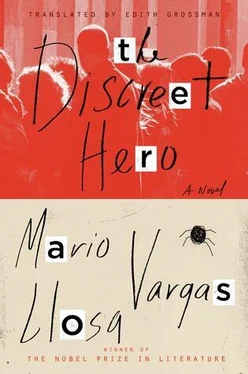“Of course you’re making fun of me, Papa, don’t you see?” Fonchito protested. “I didn’t say he’s the devil or an angel either. I think he’s a person like you and me, flesh and blood, of course, and very normal. If you like, we can end this conversation now and never talk again about Señor Edilberto Torres.”
“It’s not a game, it doesn’t seem to be one,” said Rigoberto very seriously. Father O’Donovan had stopped laughing and now was listening attentively. “The boy, though he doesn’t say so, is completely changed by this. He’s another person, Pepín. He always had a healthy appetite, he was never a fussy eater, and now he barely takes a mouthful. He’s stopped playing sports, his friends come by for him and he invents excuses. Lucrecia and I have to push him to go outside. He’s become taciturn, introverted, reticent, and he was always so sociable and talkative. He’s constantly withdrawn, as if a great worry were eating him up inside. I no longer recognize my son. We took him to a psychologist who did all kinds of tests. And the diagnosis was that nothing’s wrong, that he’s the most normal child in the world. I swear to you we don’t know what else to do, Pepín.”
“If I were to tell you the number of people who believe they see visions, Rigoberto, you’d be flabbergasted,” said Father O’Donovan, attempting to reassure him. “Generally they’re old women. It’s more unusual among children. They have bad thoughts more than anything else.”
“Couldn’t you talk to him, old man?” Rigoberto was in no mood for jokes. “Counsel him? I mean, I don’t know. It was Lucrecia’s idea, not mine. She thinks maybe with you he could be more open than he is with us.”
“The last time was at the Larcomar Cineplex, Papa.” Fonchito had lowered his eyes and hesitated when he spoke. “Friday night, when Chato Pezzuolo and I went to see the new James Bond. I was caught up in the movie, having a terrific time, and suddenly, suddenly…”
“Suddenly what?” urged Don Rigoberto.
“Suddenly I saw him, sitting next to me,” said Fonchito, his head lowered and breathing deeply. “It was him, no doubt about it. I swear, Papa, there he was. Señor Edilberto Torres. His eyes were shining, and then I saw tears running down his cheeks. It couldn’t have been the movie, Papa, nothing sad was on the screen, everything was fighting, kissing, adventures. I mean, he was crying over something else. And then, I don’t know how to tell you this, but it occurred to me that he was so sad because of me. I mean, that he was crying because of me.”
“Because of you?” Rigoberto spoke with difficulty. “Why would that man cry for you, Fonchito? What in you could he feel sorry about?”
“I don’t know, Papa, I’m just guessing. But otherwise, why do you think he’d cry, sitting there beside me?”
“And when the movie was over and the lights went on, was Edilberto Torres still in the seat next to yours?” Rigoberto asked, knowing perfectly well what the answer would be.
“No, Papa. He was gone. I don’t know exactly when he got up and left. I didn’t see.”
“All right, fine, of course,” said Father O’Donovan. “I’ll talk to him as long as Fonchito wants to talk to me. But don’t try to force him. Don’t even think about obliging him to come here. Nothing like that. Let him come willingly, if he feels like it. So the two of us can talk like a couple of friends, present it to him like that. Don’t take this too seriously, Rigoberto. I’ll bet it’s just some kid’s nonsense.”
“I didn’t, at first,” Rigoberto said. “Lucrecia and I thought that since he’s a boy with a lot of imagination, he was inventing the story to make himself important, to keep us hanging on his words.”
“But does this Edilberto Torres exist or is he an invention?” asked Father O’Donovan.
“That’s what I’d like to know, Pepín, that’s why I’ve come to see you. So far I haven’t been able to find out. One day I think he does exist and the next day I think he doesn’t. Sometimes I think the boy’s telling me the truth, and other times I think he’s playing with us, fooling us.”
Rigoberto had never understood why Father O’Donovan, instead of pursuing teaching and an intellectual career as a scholar and theologian within the Church — he was erudite and sensitive, loved ideas and the arts, and read a great deal — had stubbornly confined himself to pastoral work in a very modest parish in Bajo el Puente, where the residents were uneducated as a rule, a world in which his talent seemed wasted. Once he had dared to ask him about it. “Why didn’t you write or give lectures, Pepín? Why didn’t you teach at the university, for example?” If there was anyone among his acquaintances who seemed to have a clear intellectual vocation, a passion for ideas, it was Pepín.
“Because I’m needed more in my parish in Bajo el Puente.” Pepín O’Donovan only shrugged. “Pastors are needed; there are more than enough intellectuals, Ears. You’re mistaken if you think it’s difficult for me to do what I do. Parish work interests me a great deal, it plunges me headfirst into real life. In libraries, one sometimes becomes too isolated from the everyday world, from ordinary people. I don’t believe in your spaces of civilization that set you apart from others and turn you into an anchorite, but we’ve already discussed this.”
He didn’t seem like a priest because he never touched on religious subjects with his old schoolmate; he knew that Rigoberto had stopped believing when he was in the university, but being friends with an agnostic didn’t seem to discomfit him in the least. On the few occasions he had lunch in the house in Barranco, after getting up from the table, he and Rigoberto would usually go into the study and play a CD, generally something by Bach, whose organ music Pepín O’Donovan loved.
“I was convinced he was making up all those appearances,” Rigoberto explained. “But this psychologist who saw Fonchito, Dr. Augusta Delmira Céspedes, you’ve heard of her, haven’t you? It seems she’s very well known. She made me doubt again. She told me and Lucrecia in no uncertain terms that Fonchito wasn’t lying, that he was telling the truth. That Edilberto Torres exists. She left us very confused, as you can imagine.”
Rigoberto told Father O’Donovan that after going back and forth about it for a long time, he and Lucrecia had decided to find a specialized agency (“One of those agencies that jealous husbands hire to spy on their erring spouses?” the priest asked mockingly, and Rigoberto nodded: “Exactly”). A detective would follow Fonchito whenever he left the house, alone or with friends. The report from the agency—“which, by the way, cost me a fortune”—had been eloquent and contradictory: At no time had the boy had the slightest contact anywhere with older men, not at the movies, or at the Argüelles family’s party, or when he went to school or came home, or even in his fleeting visit to a discotheque in San Isidro with his friend Pezzuolo. And yet, in that discotheque, when Fonchito went to the bathroom to pee, he’d had an unexpected encounter: There was the aforementioned gentleman, washing his hands (of course there was nothing about this in the report from the agency).
“Hello, Fonchito,” said Edilberto Torres.
“At the discotheque?” asked Rigoberto.
“In the bathroom at the discotheque, Papa,” Fonchito specified. He spoke with confidence, but it seemed as if his tongue were heavy and each word required enormous effort.
“Are you having a good time here with your friend Pezzuolo?” The gentleman seemed disconsolate. He’d washed his hands and now was drying them with a paper towel he’d just pulled from the small box on the wall. He wore his usual purple sweater but his suit was blue, not gray.
Читать дальше

![Гарри Гаррисон - Bill, the Galactic Hero [= The Starsloggers]](/books/87536/garri-garrison-bill-the-galactic-hero-the-star-thumb.webp)










